"One Belt And One Road" and the Practice of International Construction Law Peak Forum Was Successfully Held at PKULS
Date:2017-12-12
From China's initiative to international consensus, "One Belt And One Road" has attracted worldwide attention, and has been written to the government work report of the NPC & CPPCC and UN security council resolution 2344.Detailed implementation of the "One Belt And One Road" initiative is based on international infrastructure construction, but the Chinese construction companies in the process of doing business in the countries along the "Belt and Road" faces many problems and challenges, due to the fact that they are not familiar with international construction industry rules of the game. In view of this, in order to better respond to the country's " One Belt And One Road " initiative, power Chinese construction enterprises’ development in the country all the way along the " Belt and Road ", analyze the International construction Law and practice of the initiative in the process of implementing in-depth, and also to further expand the Law school of Peking University’s influence in the domestic and International field of International construction, the Law school of Peking University held "One Belt And One Road" and the practice of international construction law peak forum at Peking University Law School on October 21 – 22, along with the Peking University institute of International economic Law and International Construction Law Association.
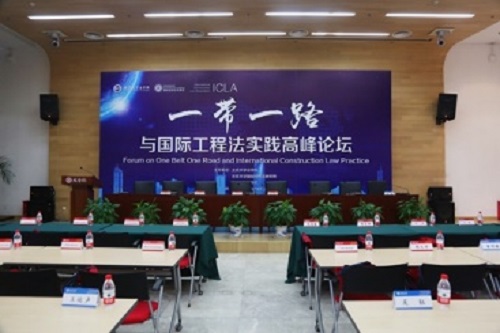
"One Belt And One Road" and the practice of international construction law peak forum at Peking University Law School
Over 30 speakers from China, the United States, the European Union, Australia, the Middle East and South America gathered in PKU during the peak forum. During the forum, Chinese and foreign guest speakers shared their practical experience and feelings of international construction law. In response to the initiative, they also explored the forefront of international construction law with the attended guests from Chinese government, construction practice, the legal profession, and the media industry.

More than 30 speakers from China, the United States, the European Union, Australia, the Middle East and South America attended forum
At 9:00 a.m. on October 21, forum opened.Professor Shao Jingchun of Peking University Law School presided over the opening ceremony. Professor Zhang Shouwen, the dean of Peking University Law School and the president of China economic law association, delivered the welcome speech.Wolfgang Breyer, the president of the International Construction Law Association, and Mr Liu Zhaobin , the council for the China Association for Quality Promotion(CAQP) and the former chief engineer of State Administration for Quality Supervision and Inspection and Quarantine, delivered keynote speeches.
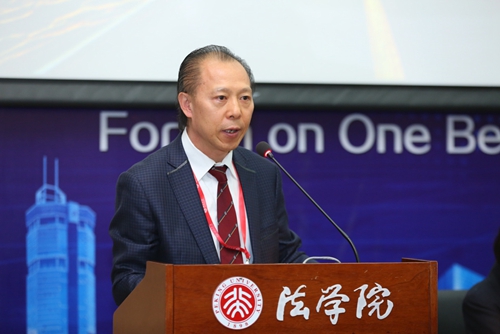
Professor Shao Jingchun of Peking University Law School officiated at the opening ceremony of forum
Dean Zhang Shouwen first extended a warm welcome to all guests on behalf of Law School of Peking University. Zhang believes: First, China's "One Belt and One Road" initiative emphasizes development and has been positively responded by many countries. In the process of building the Belt and Road initiative, we must also embody the concept of new development. For example, we should reflect how to innovate the system, how to reconcile the interests of all parties, how to protect the environment in the countries concerned and how to pursue the development of system in all aspects with an open mind, how to finally reflect the sharing, so as to truly build a community of human civilizations. Second, discussing the issue of international construction law under the background and premise of the Belt and Road initiative is a very conceptive design. Under the promotion of Professor Shao Jingchun, the International Construction Law has made great progress in China's research. Almost all sectors of law are covered in this area, including labor issues and dispute resolution issues in social law, from contracts to property rights, from finance to taxation, from industry to competition. International construction law, like international construction, covers a very wide and complex area. Thirdly, the Belt and Road initiative is also a major international project. It also needs to strengthen the legal system itself. Finally, Dean Zhang expressed his expectation on the views and theoretical contributions made by the participants and once again thanked the participants for their long-term support of Peking University Law School.
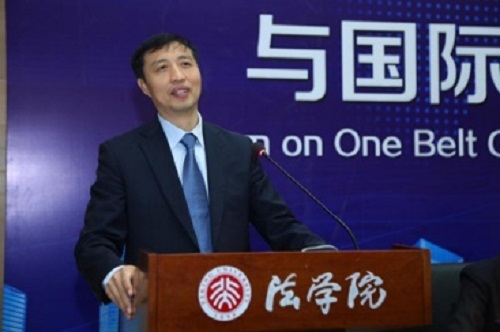
Professor Zhang Shouwen, dean of Peking University law school and the president of China economic law association, delivered the welcome speech
Dr. Wolfgang , the president of the International Association of Construction Law , first introduced the purposes and philosophy of the International Association of Construction Law. He pointed out that IAB was established in May 2015 and the board of directors includes lawyers, legal advisers, construction professionals, judges and scholars specializing in international construction law. The Association welcomes all those interested in international construction law.
Then, Dr. Wolfgang made a wonderful speech on the theme of the international standard contract text. He pointed out that in determining whether an international standard contract is the best choice, the first step is to fully understand the construction in progress. The second step is to fully understand the causes of domestic construction disputes, including different understanding of the terms of the contract. The third step is to clarify relevant legal issues in international construction disputes, including the understanding of contract terms, verbal and written language, cultural conflicts and diversified habits. The fourth step is to clarify the laws that should apply to the project. The fifth step is to address the specific circumstances of the construction of the Belt and Road Initiative. The standard contractual texts will be subject to appropriate changes, including FIDIC, NEC and PPC. Finally, Dr. Wolfgang pointed out that omnipotent contracts do not exist, but we can make full use of international standard contract texts on a case-by-case basis.

Dr. Wolfgang, President of the International Association of Construction Law, made a keynote speech
Mr. Liu Zhaobin, President of China Quality Promotion Association and former chief engineer of General Administration of Quality Supervision, Inspection and Quarantine, whose keynote address is "The Belt and Road" and Technical Regulations. Since President Xi Jinping proposed the one-way cooperation initiative in the fall of 2013, remarkable achievements have been made. These achievements include: First, the world-wide consensus. More than 100 countries and international organizations took part in the construction of the B & R. In November last year, the United Nations raised the Belt and Road Initiative as an important strategy promoted by the United Nations. Secondly, the economic and trade cooperation has achieved remarkable results. In 2016, China's import and export trade with the countries along the Belt and Road is up to a total amount of nearly 1 trillion U.S. dollars. In 2016, China's total contracted business of the state along the Belt and Road Initiative reached a total of 76 billion U.S. dollars. Third, the mechanism has achieved fruitful results. China has signed cooperation agreements with over 40 countries and regions along the route. At the same time, the establishment of the AIIB and Silk Road Funds has laid the foundation for the financial cooperation along the Belt and Road.
Mr. Liu Zhaobin pointed out that in the construction of the rule of law, technical regulations are quite important but easily overlooked. Technical regulations have two salient features. First, the technical regulations are first of all regulatory normative documents. In accordance with the international understanding, it is reflected in the relevant laws, administrative regulations and departmental rules. However, there are two exceptions in China: First, the main manifestation of China's technical regulations is the mandatory national standard stipulated by the State Standardization Law. Second, the manifestation of Chinese technical regulations includes special normative documents, namely, some departments or specialized fields Technical specifications, technical regulations and some mandatory management requirements. Such documents are not laws in themselves, but they are based on higher-level laws with technical requirements, such as China's metrological verification rules and measurement specifications. Second, technical regulations require special technical requirements. Technical laws and regulations have a safeguard role, rational use can facilitate trade and promote technological progress, improper use will result in technical barriers to trade. Mr. Liu believes that the standard conformity assessment procedures of technical regulations should be a bridge instead of an obstacle in international trade. On how to change the barrier of technology laws and regulations into bridge, he suggested deepening the study through the way of think-tanking, strengthening communication with countries along the Belt and Road and improving the mechanism of linkage notification, negotiation and dispute resolution.
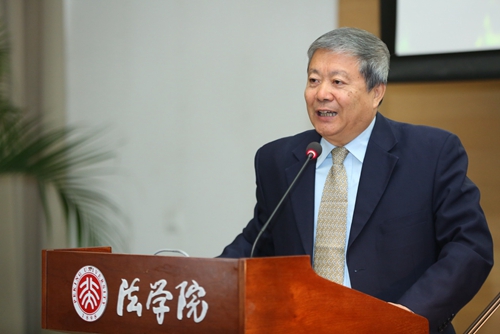
Mr. Liu Zhaobin, President of China Quality Promotion Association and former chief engineer of General Administration of Quality Supervision, Inspection and Quarantine, delivered a keynote speech
The first forum was chaired by Professor He Qisheng, Law School of Peking University. The theme of the forum was "Belt and Road" and China-EU legal services. Mr. He Wei, Deputy Director General, Business Integration Department, China Development Bank; Mr. Tao Jingzhou, Senior Partner, Dejor Law Firm; Andrey Oleinikov, Director, ZapSibNeftekhim Law Office, Russia; Counselor Ms. Anna Kremleva, Professor Wang Jun of China University of International Business and Economics Law Faculty, Dispute Settlement Expert Stefan Leupertz, Bruce Collins QC, Lawyer Chris Ennis made keynote speeches successively.
Tao Jingzhou, a senior partner of Dejor Law Offices, explained the dispute resolution mechanism in the Belt and Road. Lawyer Tao believes that the construction project is an important component of the Belt and Road Initiative. He pointed out three ways to solve the controversial construction project. The first is to seek relief from the local courts. The hidden dangers of the method are unfamiliar with the local language and the fairness of the local courts. The second method is to settle disputes through commercial arbitration. Tao counsel suggested that the parties first verify whether the arbitration agreement can be signed and then select the arbitration institution and the place of arbitration in the arbitration agreement. He pointed out that both parties may choose to arbitrate in third countries such as Singapore, Paris, London and other friendly places of arbitration, or may choose to interim arbitration. In addition, he also reminded the parties to elaborate the name of the arbitration institution in the arbitration agreement. The third is the settlement of disputes through investment arbitration. Usually the bilateral investment treaty between two countries will include an arbitration clause.

Mr. Tao Jingzhou, a senior partner at Dejor law firm, made a keynote speech
Mr. Andre and Ms. Anna from Russia introduced to the participants the Russian construction laws and regulations and contract management experience. Mr. Andrey said that the Russian law of construction includes the Russian Civil Code, the Code of Urban Construction, the Land Law, and building standards and codes. In terms of design, after the design of the construction project is completed, the owners and contractors should submit them to the relevant government departments for review and approval or they will not be able to start the construction. The design side is responsible for the design during the life of the construction project. In construction, the longest warranty period of the construction project is 5 years.
In terms of tax revenue, "China and Russia Avoidance of Double Taxation Agreement" entered into force in 2014. Chinese enterprises that undertake business in Russia and have registered offices or agencies should pay enterprise income tax, personal income tax and value-added tax to the government of the Russian Federation. In terms of work permits and visas, the procedures for handling visas in Russia are complex and the procedures are long. Chinese enterprises that conduct projects in Russia need to apply for quotas in advance. In guiding price of construction projects, the Russian government promulgated a construction project guidance price, public works projects must be strictly enforced the price, while private projects do not have such mandatory requirements, but the private owners will generally continue to use the Guide price in the contract negotiations. Lastly, Mr. Andrey suggested that Chinese companies visiting Russia should also pay close attention to the risks posed to the project by the climate, language, culture and local construction market in the country.
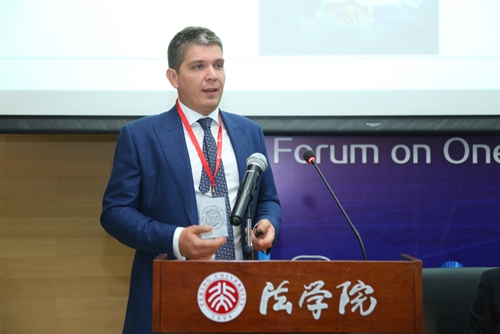
Andrey Oleinikov, director of the law firm ZapSibNeftekhim in Russia, made a keynote speech
Professor Wang Jun of Law School of University of International Business and Economics discussed the double liability system of marine oil pollution damage. He pointed out that the Gulf of Mexico oil pollution in the United States in 2010 had a serious impact. In 2011, the oilfield jointly developed by ConocoPhillips and CNOOC also suffered a serious leak in the Bohai Sea in China. In response to the responsibility of polluters, the solution in the United States mainly relies on a whole set of compensation system: stipulating a certain limit of responsibility for the polluters who should bear the responsibility; in the limit of liability, strict liability as the principle of liability; and in certain If, for example, the person responsible has a gross fault, the burden of aggravating responsibility outside the upper limit is assumed. Matched with such a system, is the establishment of the relevant compensation fund. At present, the issue of compensation for oil pollution in the Gulf of Mexico in 2010 has basically been solved. In contrast, China does not impose a ceiling on the liability of polluters and applies strict liability. When the system was used for the ConocoPhillips oil pollution incident, ConocoPhillips and CNOOC were unable to pay for the compensation and could not completely solve the problem. Professor Wang Jun pointed out that this double-liability system was not first initiated by the United States. The relevant international conventions on ship pollution have long adopted the double-liability system. Through case studies, Professor Wang believes that China should change the law, set the maximum liability, and in the case of major errors to break the liability limit requirements. The advantage of this approach is that it can attract foreign businessmen to drill wells and promote the development of the insurance industry, and at the same time, will not let those responsible for gross negligence run away.
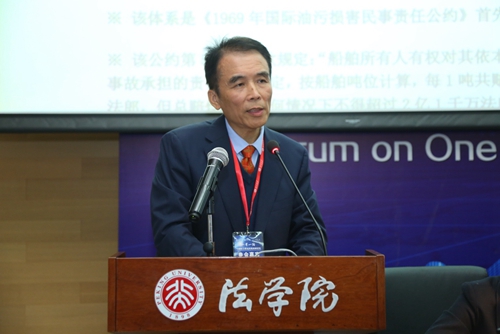
Professor Wang Jun of Law School of University of International Business and Economics made keynote speech
The second forum was moderated by John Bishop, president of J.M.Bishop Construction Consulting, UK, with the theme of Standard Format and Legal System. Speakers included Dr. Hu Yuanxiang, President of ING Beijing Branch, Jack Tieder, Partner of Watt Tieder Hoffar & Fitzgerald LLP, Dr. Guo Weihua, general manager and Legal Director of Legal Compliance Department of China Huarong Asset Management Co., Ltd., and David Brown, a partner at Clyde & Co.
Tieder's speech was entitled "Admission and Different Geological / Ground Conditions." Attorney Tieder believes that in the process of the implementation of such linear projects as roads, railways, tunnels, pipelines and transmission networks in countries along the Belt and Road, there is a risk that the project site will be long and the land ownership structure will be complex. To this end, Chinese contractors should try their best to make the owner undertake land acquisition and handle the risks of entering into the market. In addition, Chinese contractors should also comply with the local mandatory requirements on noise pollution, environmental pollution and statutory working hours during the implementation of linear projects. Finally, Tieder lawyer reminded Chinese contractors to pay attention to the geological risks in linear projects, especially in tunnel projects. Before signing the contract, they conducted a comprehensive study on the geological conditions along the project so as to avoid the construction period and cost risks caused by geological conditions.
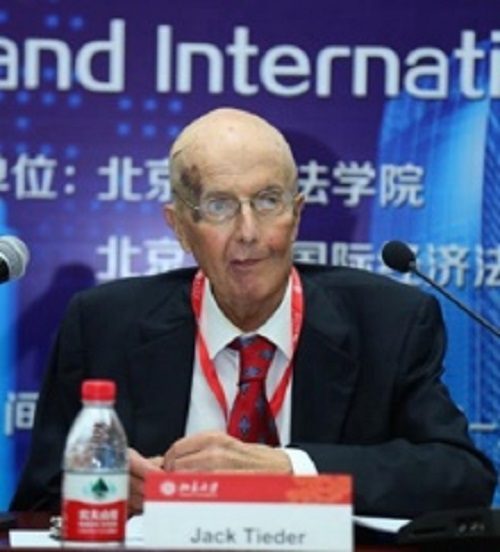
Jack Tieder, a partner at the law firm Watt Tieder Hoffar& Fitzgerald, spoke on the subject
The theme of David Brown's speech is "Loss of Mistakes." Lawyer Brown said that there are differences between different legal systems in the recognition of the validity of the mistake loss terms. For example, under the Anglo-American legal system, even though both parties to a construction contract explicitly accept the terms of the loss, the defaulting party only compensates the non-defaulting party for reasonable and foreseeable damages. Brown's lawyers pointed out that at present Anglo-american countries like the United Kingdom, the United States, Canada, Singapore and Kenya, still do not recognize the punitive feature of the loss of the period, except India. Considering the difference between the terms of the loss due to mistakes by the civil law countries and Anglo-American law countries, Brown proposed that Chinese construction enterprises should not only rely on the contract model when entering into the contract, but also stipulate in detail the terms of the loss on the basis of thorough research on the law of contract.
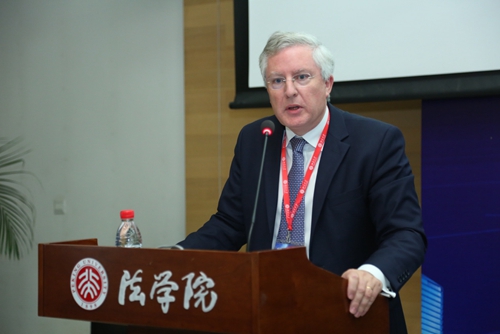
David brown, a partner at Clyde&Co, made a keynote speech
The third forum was moderated by Mr. Wu Gaosheng, former director of the Legislative Planning Division of the Standing Committee of the National People's Congress of China. Speakers included Mr. Kim Rosenberg, Partner of Dubai, Freshfields Bruckhaus Deringer LLP, General Counsel of China Metallurgical Group Corporation Yang Jingzhou, a lawyer with PMG partner Radu Ionescu, and Zhao Dongfeng, managing partner of Beijing Huanchen Law Firm, and vice president of China Construction Branch of International Construction Law Association.
Lawyer Rosenberg shared her experiences and insights on design responsibility and risk sharing with participants. Rosenberg believes that the design should be punctual, complete, coordinated, constructive and in line with the owners’ purpose of the use of the building. Design responsibility is based on the contract, the law applicable to the contract and the country where the project is located. Rosenberg made a number of suggestions to Chinese construction enterprises, including attaching importance to many risks involved in construction projects, carefully negotiating the design responsibility clause in the contract, paying attention to the applicable law of the contract and the mandatory design responsibility in the country where the project is located.
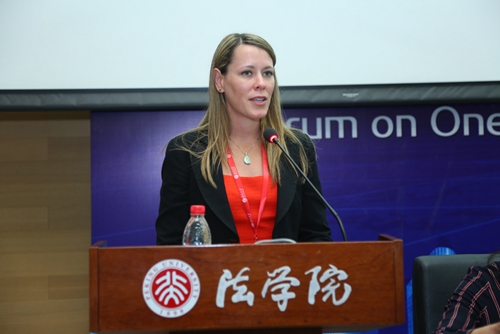
Lawyers for Freshfields Bruckhaus Deringer, dubai partner Kim Rosenberg, spoke on the subject
Lawyer Zhao Dongfeng made a wonderful speech on how to better provide legal services for international projects under the "Belt and Road Initiative." Lawyer Zhao made a number of suggestions, including familiarizing himself with the relevant laws or the rules of the game, keeping up with the changes in the types of construction business, being familiar with the major or field involved in international projects, having some experience in international project management, exporting good laws or Routine approaches to conducting courses or training in international construction law in Chinese universities as well as setting up a sound global network of institutions for legal service agencies in China.
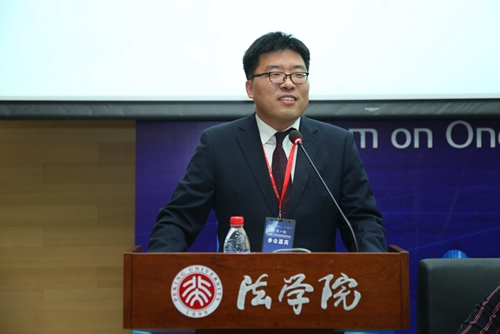
Zhao Dongfeng, managing partner of the law firm Huan Chen in Beijing, made a keynote speech
On the morning of October 22, in accordance with the agenda of the meeting, the fourth and fifth forums were held in Room 307, Kaiyuan Building, Peking University Law School. The fourth forum was chaired by Dr. Wolfgang to discuss the topics of claims and disputes, Mr. Denis Wang, Partner of Clyde & Co, Associate Professor Zhang Zhiyong, Law School of Peking University, Mr. John Bishop, J.M.Bishop Construction Consulting Co., Ltd., UK and Mr. Yu Xinfeng, Senior Economist of China Export & Credit Insurance Corporation gave speeches on this topic. Session 5 was chaired by Prof. Shao Jingchun, Peking University Law School. Mr. Arioeira Salles, Founding Partner of Arioeira Salles, Brazil, Arbitrator Philippe Bruna, Professor He Qisheng, School of Law, Peking University, Mr. Schulze-Hagen, Founding Partner of Hagen & Horschitz LLP, and Mr. Tian Wenjing, Partner of King & Wood LLP, gave keynote speeches.
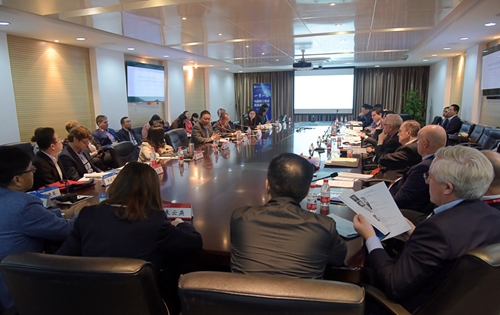
"One Belt And One Road and the international construction practice peak forum" at Peking University law school
Associate Professor Zhang Zhiyong, Peking University Law School, whose speech is entitled "Changing International Tax Law - Reflections on the Background of Economic Globalization." He pointed out that the traditional international tax laws are facing a series of challenges. Under the background of economic globalization and regional integration, the traditional international tax rules need to be changed. Although the maintenance of the tax base is the main objective of change, the rules of change should not become a barrier to the development of international commerce. Due to the unification of the tax systems in various countries, bilateral tax treaties still play an important role. However, regional and multilateral mechanisms should not be overlooked either. Tax treaties, trade agreements and investment agreements should also be coordinated. China is a big country as well as a large developing country. The acceptance of international rules and the win-win situation should take the interests of the country as its starting point. The improvement of the domestic tax system is the basis for leading the international rules.
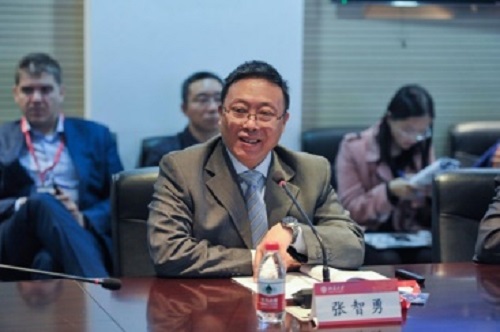
Zhang Zhiyong, associate professor of Peking University law school, made a keynote speech
Mr Bishop's speech is "Mediation." Attorney Bishop believes that the mediation dispute resolution mechanism began in the United Kingdom, followed by a number of countries, such as the Singapore International Arbitration Center, who, in 2014, established the Singapore International Mediation Center. Lawyer Bishop believes that the advantages of mediation lie in: (1) high success rate; (2) mediation by a neutral third-party mediator familiar with technology, culture and dispute mediation; (3) flexibility; (4) both parties seek common interests instead of identifying right and wrong during the mediation, which is conducive to agreement on a voluntary basis between the parties; (5) the confidentiality of the conciliation proceedings is high; (6) the costs of the conciliation proceedings are low and fast; (7) ) mediation suits the complicated technical dispute, and the dispute of the project often involves many complicated technical problems.
In view of many advantages of mediation, Counsel Bishop's proposal: (1) the integration of mediation into the different provisions of the international construction contract, give full play to its advantages; (2) starting the mediation process once the dispute occurs; (3) assigned specialists on the project site are responsible for mediation, for example, dispute settlement advisors have achieved good results in Hong Kong.
Finally, regarding mediators serving as arbitrators in the same dispute, Counsel Bishop notes that while the Institute of International Arbitration of Hong Kong considers mediators to be arbitrators of the same dispute, the majority of country courts and arbitration institutions consider this issue inconclusive. Therefore, if the mediator concurrently serves as the arbitrator of the same dispute, Chinese enterprises should give full consideration to the possible adverse impact this may have on the enforcement of the arbitration award.
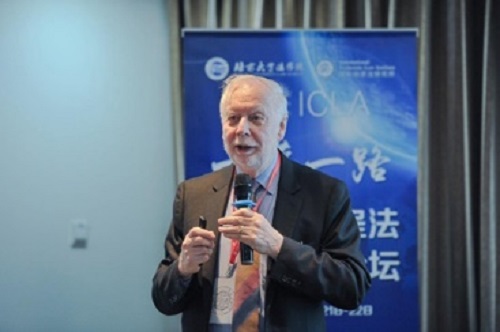
John Bishop, director of UK J.M.Bishop construction consulting co., LTD
Salles from Brazil introduced and analyzed Brazilian construction law and practice for the participants. Salles said that Brazil's construction contracts are divided into government project contracts and private project contracts. Generally speaking, the government contracts usually use fixed text. The public department as the owner usually has the right to unilaterally change the contract. Once the contractor is awarded the contract, the project must be implemented strictly in accordance with the bidding documents. The risk of exchange rate fluctuation is generally borne by the contractor. In private project contracts, private owners and contractors are free to agree on the terms of the contract, but not in violation of Brazil's mandatory norms, such as the need to use Brazilian real as the payment currency.
In the area of dispute resolution, Mr. Salles pointed out that the majority of private projects are using fixed-form contracts, and such standard-form contracts and their dispute resolution provisions are generally in compliance with Brazilian law. There are no specialized courts or tribunals in Brazil that deal specifically with construction disputes. Most of the large private works / infrastructure projects in Brazil provide for dispute resolution in domestic arbitration or international arbitration. Judges generally support the validity of the arbitration agreement and the enforcement of the arbitration award. In the government projects, though arbitration is also a possible dispute resolution method, most government project contracts adopt a separation mechanism, that is, apart from technical problems on which arbitration must be submitted and all other matters resolved through litigation.
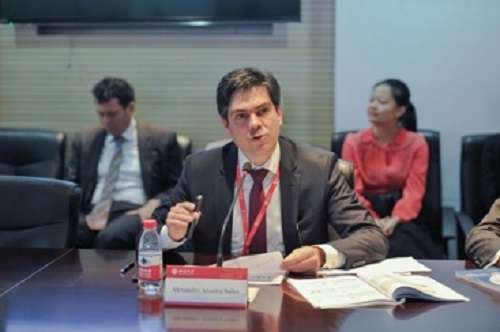
Mr. Alexander Arioeira Salles, a founding partner of Brazil's Arioeira Salles, made a keynote speech
Professor He Qisheng's speech is entitled "The Initiative in Negotiation and the Settlement of International Construction Disputes". Professor He firstly introduced the situation of China's foreign contracted projects in 2016. He pointed out: We should analyze the capital and technological advantages of Chinese enterprises going global and clarify the negotiating power of Chinese enterprises. Through the survey and investigation on the dispute settlement methods of 25 state-owned enterprise project contracting disputes, the results show that 71.6% of the project disputes are resorted to arbitration and 28.4% of the project disputes are litigated. Professor He believes that the reasons for the parties to choose arbitration are generally the differences in the legal status of various countries and the possible existence of local protectionism. Unless the local law has mandatory requirements, or the owner is more powerful, or the contract amount is relatively small, otherwise the contractors generally do not choose to settle the dispute through litigation.
As far as the negotiation's initiative is concerned, Professor He pointed out that most Chinese enterprises think that the initiative is greatly influenced by the objective factor of contract negotiation status. He believes there is still plenty of room for us to improve our bargaining power in the legal services such as construction dispute resolution. China needs a large number of international law talents with bargaining power. Against this background, the "International Construction Law Training Project" has a long-term vision of development and should have a significant impact.
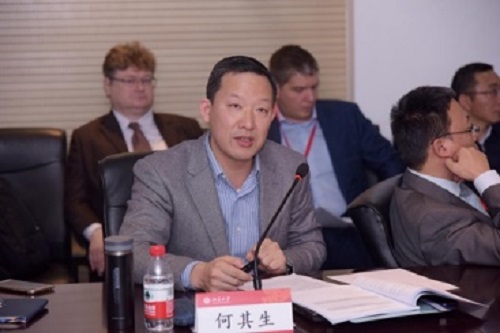
Professor He Qisheng from Peking University law school
Dr. Hagen introduced the implementation of the verdict. Dr. Hagen said that adjudication, as one of the means of dispute settlement, is an effective way to resolve disputes before litigation or arbitration. At present, the United Kingdom, Australia, Ireland, Malaysia, New Zealand, Singapore and Hong Kong, China, have made the ruling that adjudication is a mandatory procedure for dispute resolution. The FIDIC contract provisions, the ICC Dispute Board Rules, and the DIS Rules on Adjudication also recommend that both parties choose an award to resolve the dispute.
Dr. Hagen believes that the smooth implementation of the project is the common goal of the owners and contractors. If there is a dispute between both parties, the decision should be taken firstly to solve the problem quickly, to ensure that the owner will continue to pay and the contractor will continue to implement the project. In practice, although the adjudicator's decision does not have the force of effect similar to a court judgment or an arbitral award, it constitutes a contractual obligation that is binding on both parties and, if the owner or contractor violates or fails to make the decision, it constitutes a breach of contract.
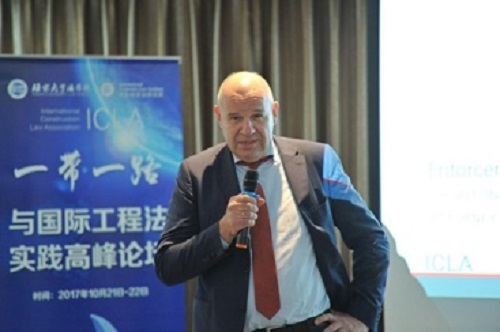
Schulze-hagen, a founding partner of the law firm schulze-hagen & Horschitz, made a keynote speech
At the closing ceremony, Professor Shao Jingchun summarized the achievements of the forum. Professor Shao pointed out that this forum is of great significance. The participants include not only professors from the legal science community, but also lawyers, arbitrators, judges, company leaders and government officials from legal practitioners. The discussion is more profound and full. In addition, participants exchanged ideas, shared information, proposed ideas and initiatives, and participants deepened their mutual understanding and win-win cooperation. Finally, Professor Shao expressed his heartfelt thanks to all the guests for their support and contributions made by the staff. The "One Belt And One Road" and the practice of international construction law peak forum successfully concluded with warm applause from participants.
The "One Belt And One Road" and the practice of international construction law peak forum is an important part of the International Construction Law Program for the Peking University Seminar, stage one and stage two students all said that by participating in this forum, they are more profoundly aware of the importance of international construction law. In the future, they will continue to integrate theory with practice and actively implement the "Belt and Road Initiative" against the basic laws and practical issues in the field of international construction law. They will keep up with the development strategy of "One Belt and One Road" and they must take a solid step towards realizing the great practice of "One Belt and One Road".
Under the strategic background of advancing the "Belt and Road" and "Going Global" initiatives in our country, the study of international construction law has become more and more important in China's foreign trade. Peking University Law School opened a precedent for modern legal education in China, shouldering its historic mission, paying attention to and resolving major realities in the country's economy and society, and setting up the first national seminar in the field of international construction law.
The Peking University Seminar on International Construction Law selects the pillars of the legal community and the business community nationwide. It is taught by outstanding experts and scholars in the field of international construction at home and abroad to cultivate the leading legal elite and pay attention to the actual social needs with the courage to innovate and break through. It is aimed at implementing the national strategy and training qualified law and management leading personnel in the international construction and legal circles in China to strive to establish the world's first discipline of international construction law.
At present, the 2nd International Construction Law Seminar of Peking University has officially started and been promoted in an all-round way. Drawing on the experience and achievements of the first Construction Law Seminar, the second seminar will seek further breakthroughs and will continue to shoulder its historic mission, follow the guidelines of the times, focus on cutting-edge issues of concern and curriculum design, and bring together the world's industry leaders and academic forces, strive to create a new chapter in the cause of international construction law!
Translated by Guo Yuxuan
Edited by Tian Junxin



